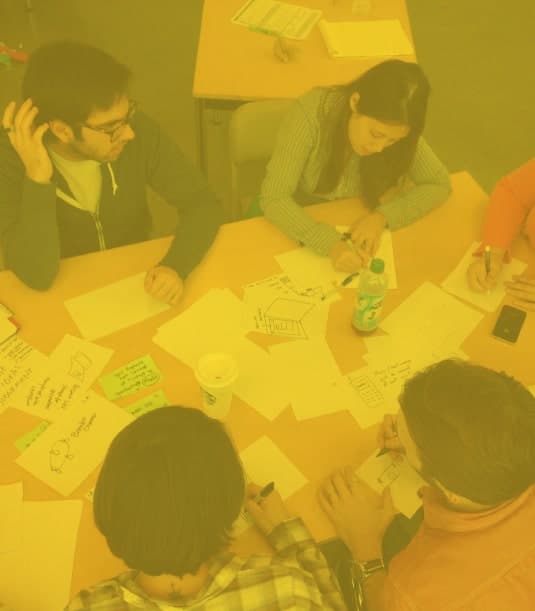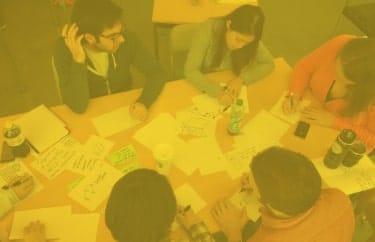Menu

Complete your M.P.S. in UX Design in just 15 months with an accelerated, 100% online format. With no set class times, you learn when and where it works for you. Throughout the program, you’ll collaborate with peers and faculty, enabling you to succeed in the online learning environment.
Learn by doing and engaging in hands-on coursework, case studies, and real-world projects designed to help you immediately apply UX Design techniques in your current work. Engaging multimedia course content enhances your learning experience, making it easier to grasp concepts and apply them effectively.
At MICA, you belong to a welcoming and supportive community that fuels innovation and professional growth. Our M.P.S. programs equip creatives with the skills, connections, and resources needed to thrive in evolving industries. Industry-leading faculty provide ongoing support through office hours and constructive feedback, ensuring you stay engaged throughout the program.
Throughout the program, you’ll create a professional UX portfolio, culminating in a final capstone project. Applying UX techniques to real-world projects builds in-demand skills and prepares you for future career goals.
Access our comprehensive career development services, develop powerful career advancement strategies, benefit from optional professional skills-based workshops, and learn from professionals with hands-on experience to ensure you advance in your UX career.
Stay ahead in the field with cutting-edge UX design tools and best practices. Through hands-on application, you’ll refine your ability to create intuitive, user-centered experiences that drive real impact and prepare you for career growth.
Adjunct faculty member Christine Lee Chang shares how MICA’s flexible online Master of Professional Studies in UX Design empowers creative professionals to advance their careers without putting their lives on hold.
UX Design is ubiquitous and essential to everything in the digital world from websites, to products, to apps. This program will give you the skills, knowledge, and confidence to excel as a UX Designer and have an impact on real world projects. Your courses will focus on analytic, problem-solving, and design skills that matter in today’s world to prepare you to thrive in the UX space. By utilizing a multi-pronged approach that places emphasis on theoretical and prototypical research and development while equally weighing the importance of application, you will leave this program with an advanced level of UX knowledge that will enable you to see any project through from start to finish.
In addition to the courses detailed below, workshops are offered throughout the program at no additional cost, topics may include:
To ensure student success in the program, students will complete an asynchronous orientation course in Canvas as a means to introduce them to the navigation of MICA’s administrative tools as well as inform them of academic services available through MICA. The content and assignments in the orientation course are designed to be an introduction to the program as well as a resource throughout the students’ time at MICA.
This first course is essential to define and develop a properly-formulated problem statement that drives research and the systematic approach to gathering and interpreting collected data to identify the needs of each target user base. UX methods and techniques, including user interviews, contextual inquiries, personas, affinity mapping, and competitive analysis will be covered as students explore research methods and strategies for considering unique, realistic user types to make sound design decisions (in the next course). As a result of this course, students will be able to construct personas/archetypal descriptions of users and write a user research report/ plan.
Core Skills:
Students in this course focus on applied practices from the user research learned in the Foundations of UX Research course. Here, information architecture, interaction design, visual design, and usability are discussed as students explore screen and page layout, organization, navigation, labeling, search, and other core concepts and techniques such as user flows, wireframes, and content modeling. Students will gain practical experience as they design a prototype for further development in the next course.
Students in Prototyping build on their ideas from Foundations of Design to deepen their understanding of the value and importance of prototyping within the design process. Students will learn how to use prototypes to explore, test, and communicate design ideas and they will be introduced to principles of design and usability, with a focus on digital experiences. Through an on-going assignment, students will gain practical experience while iteratively building & testing prototypes. By the end of this course, students will be prepared to present their prototypes and study them through a more human-centered design lens.
This course provides an overview and introduction to the nature of human-centered design with a special emphasis on improving UX for all people and perspectives. Students study the nature of human-machine interactions that involve visual, sound, and haptic feedback. Through readings, discussions, and exercises students explore the application of human factors in the design and evaluation of user interfaces. The history of human factors, perception, cognition, error, social factors, and the objectives of evaluating usability are also covered in this course. Additional topics of effectiveness, efficiency, and user satisfaction, along with techniques like heuristic evaluations and usability testing are studied as students learn how to solve design problems.
Design skills require a solid knowledge of practical aspects of a number of digital tools, technologies, and resources. In this course, students gain an understanding of the product design cycle from research and research synthesis to prototyping and validation. Course content focuses on employing tools commonly used in the industry for managing cross-functional teams, product design, user research, data management, project management, road mapping, and prioritization. Students complete exercises that employ these tools in ways that highlight their value for different phases of the design process while gaining proficiency and preparation in the use of these tools for the remainder of the program.
Core Skills: Exploring types of visualizations, contextualizing data visualization in the past and present
As part of your online graduate program, you’ll participate in a 1-credit-hour Industry Immersive course designed to expose you to industry professionals and prepare you for real-world applications in your field. Offered over 8 weeks in an asynchronous format, this course can be completed at your pace within the timeframe the course is open and provides valuable insights and content created by subject matter experts in your specific field.
Through a series of archived workshops and activities, you’ll explore topics which may include:
– Applying psychology to create better products and services and mastering design prompt engineering.
– Professional Development: Career advancement strategies, networking techniques, and industry-specific best practices.
This industry immersive course offers a unique opportunity to enhance your expertise, expand your professional network, and gain practical skills directly from leaders in your industry.
MICA’s industry partners are engaged throughout this course and present students with challenges faced by professionals in the UX industry. Students work in teams and are provided with access to the professional world they are about to enter. UX professionals provide feedback, insight, encouragement, and critical analysis to students as they execute their projects.
A basic understanding of the business of UX is an essential skill for successful UX designers. This course provides a foundation of business knowledge including networking, marketing, budgeting, client and stakeholder relations, and business communications. Essential project management skills are also addressed. Students gain project management skills related to the creation of strategic plans, and the knowledge of professional workflow practices. Topics include project scope, time, cost, quality, and human resource management techniques as applied to the UX industry. Students learn to design a project structure and obtain hands-on experience using project management software. Additional focus is placed on leadership, teamwork, and project risk management.
As the final course in the MPS UXD program, Capstone and Reflection requires each student to create a final portfolio containing a Capstone project from concept to a fully realized prototype. Students also provide documentation outlining their process for their design. Using research and materials developed over the course of the program, students work with a faculty advisor for guidance and critique during project development.


As part of your online graduate program, you’ll participate in an Industry Immersive course designed to simulate industry challenges and to prepare you for real-world applications in your field. Through a series of industry-relevant workshops and activities created by subject matter experts in your field, you’ll apply theoretical knowledge to real-world projects, exploring topics including:
Applying psychology to create better products and services and mastering design prompt engineering.
Career advancement strategies, networking techniques, and industry-specific best practices.
This industry immersive course offers a unique opportunity to enhance your expertise, expand your professional network, and gain practical skills directly from leaders in your industry.
This course is a 1-credit hour course. It is offered over 8 weeks in an asynchronous format and can be completed at your pace within the timeframe the course is open.